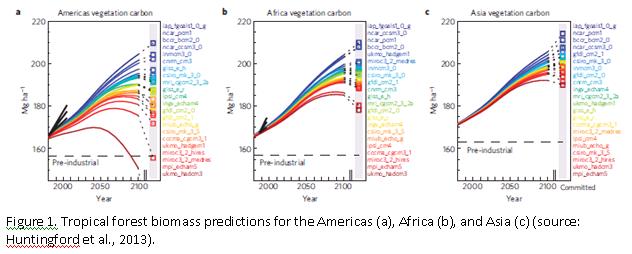From the authors of a new paper just-published in the journal Nature Geoscience comes this surprising finding:
Tropical forests are less likely to lose biomass – plants and plant material – in response to greenhouse gas emissions over the twenty-first century than may previously have been thought.
A rare “not as bad as we thought” admission about the impacts of manmade global warming!
Not only that, but based on recent findings that the true climate sensitivity is much lower than climate models emulate—findings not incorporated in new study—the results are probably still even more “not as bad as they thought” than they thought!
Chris Huntingford from the U.K’s Centre for Ecology & Hydrology and colleagues coupled climate model projections to a land surface/vegetation model to see how the tropical forests in the Americas, Africa, and Asia respond to changes in atmospheric conditions. Their vegetation model includes interactions between terrestrial plants and influences such as temperature, precipitation, and the carbon dioxide concentration of the atmosphere (a plant fertilizer).
Unlike other studies which used a very limited selection of climate models and less sophisticated vegetation models, the Huntingford team found that in virtually all future simulations that the biomass of tropical forests increases over the course of the 21st century. This is a significantly different result than many previous which suggested that anthropogenic climate change would lead to, as Huntingford et al. put it, “catastrophic losses of forest cover and biomass.”

Perhaps most interestingly, the major driver for the biomass increase is the projected growth in atmospheric carbon dioxide concentration (thanks to our use of fossil fuels). The model projected changes in precipitation had little impact on the biomass predictions and the projected increase in temperature acted to decrease the biomass (although not as much as additional carbon dioxide acted to increase it).
No comments:
Post a Comment